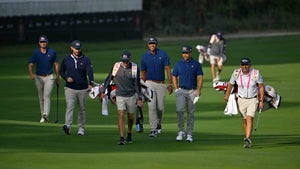Twenty-four golfers participating in the Presidents Cup this week won’t see a dime in prize money once the event concludes at Royal Montreal. According to the PGA Tour’s website, which sponsors the event, the first question in the “Frequently Asked Questions” section is straightforward: “What is the Presidents Cup?”
The answer provided offers a detailed explanation:
“The Presidents Cup is a biennial global team competition featuring players from the United States and an International team representing the rest of the world, excluding Europe. The venue alternates between locations in the U.S. and overseas. What makes the Presidents Cup unique is that there is no prize money for the participants. Instead, each player directs an equal share of the funds raised to charities of his choosing. Since its inception in 1994, the Presidents Cup has generated over $56.4 million for various charitable causes. Over the past 25 years, it has benefited more than 475 charities across 18 countries. Cognizant and Rolex serve as the exclusive Global Partners of the Presidents Cup.”
This statement, however, brings up an important question: should players be paid for their participation in such prestigious events?
The answer is complex and depends on who you ask. This debate resurfaced during the last Ryder Cup, another men’s professional golf team event held in September, where the topic of compensation for players stirred controversy. Sky Sports reporter Jamie Weir reported that American golfer Patrick Cantlay was advocating for player compensation. Allegedly, Cantlay chose not to wear a hat as a form of protest, and it was suggested that his stance was causing division within the U.S. team. The story quickly gained traction. American players disputed the claims, and spectators at Marco Simone Golf & Country Club, the event’s venue, sarcastically waved their own hats in response. The situation escalated when Stefan Schauffele, father of U.S. team member Xander Schauffele, expressed his views to GOLF’s Dylan Dethier, stating, “They can donate all proceeds after opening the books to a charity of our joint choice, and then we will happily play for free. Please print that.”
The conversation about compensation has not quieted down since. The Ryder Cup, organized by the PGA of America for the U.S. side and the DP World Tour for the European side, generates substantial revenue, which is funneled into various events and initiatives. In return, players receive charitable donations amounting to $200,000 each. This model has sparked discussions and criticisms. In a notable commentary on the matter, Paul McGinley, a former Ryder Cup player and captain for the European team, weighed in during an October appearance on the Five Clubs podcast with host Gary Williams. McGinley was asked whether he believed compensation would be an issue for the American side by 2025 and if the European team would ever consider accepting payment.
McGinley’s response was unequivocal: neither side should receive payment. He argued that professional golfers already earn substantial amounts, and once a player reaches the level required to compete in the Ryder Cup, they are financially secure for life. “Personally, I hope it gets to a place where neither team is paid because I think the money that top professional golfers earn at the moment is huge on so many different levels,” he said. McGinley, who is covering the Presidents Cup for Golf Channel this week, added, “They’re all set up for life, no matter what. Once you make a Ryder Cup standard nowadays, you’re set up for life anyway, whether it be through your pension fund or whether it be in the prize money you’ve earned. I think for one tournament every two years it would be great to give back.”
McGinley highlighted the financial implications of the Ryder Cup for the DP World Tour, explaining that the revenue from the event supports numerous aspects of the sport, including funding for Challenge Tour events and providing decent prize funds on the DP World Tour. This, he emphasized, is crucial for the development of golf in Europe. On the American side, he noted that the money helps the 28,000 PGA professionals across the country, enabling them to introduce the game to young boys and girls and nurture the next generation of golfers, potentially future stars like Patrick Cantlay or Justin Thomas. A significant portion of the Ryder Cup revenue is reinvested into the game’s infrastructure, which has produced the very players competing at the highest levels today.
McGinley made a compelling case that both the American and European sides have noble intentions for the funds generated by the Ryder Cup. He stressed that the money does not go to private entities or shareholders but is reinvested into the sport on both sides of the Atlantic, benefiting the ecosystems that have supported the development of these elite players. For McGinley, this setup underscores the integrity of the event and its broader purpose.
“For one tournament every two years, with all the money that’s in the game at the moment and so crass the amount of money that is put to the front in the conversations around golf, I think it would be a wonderful narrative for the future of the Ryder Cup if it was not about money and it was about the 24 players being representative, helping both ecosystems that made them who they are,” McGinley concluded.
The debate over whether top golfers should receive compensation for participating in events like the Ryder Cup and the Presidents Cup is far from settled. While the current model emphasizes charity and giving back to the sport, the ongoing discussions suggest that the landscape could evolve, especially as the financial dynamics of professional golf continue to shift.
